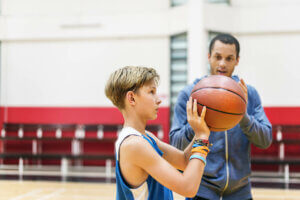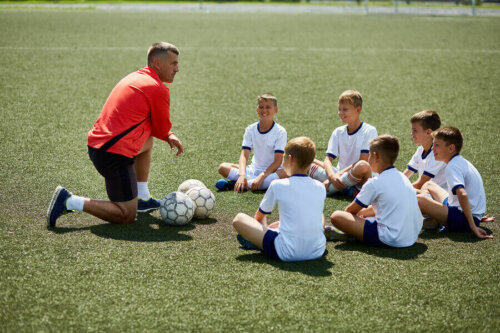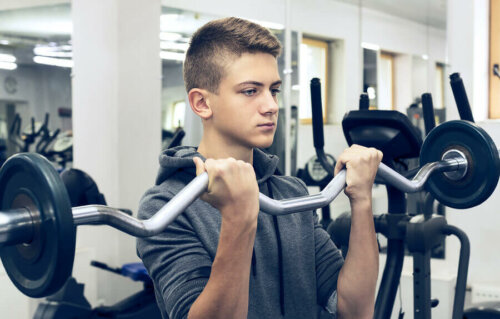Keys to Help Young People Focus on Sports

A vitally important issue concerns the keys to help young people focus on sports. Young people have different cognitive abilities than adults, which is why they require mental training adapted to their characteristics.
The prefrontal cortex, the part of the brain that controls higher cognitive functions, fully matures at 25 years of age. For this reason, the concentration limitations in young athletes should be considered in order to help them get the most out of sports.
Yes, young people have fewer attention resources, but this doesn’t mean that something can’t be done about it. In fact, this age group better adapts to changes and their learning capacity is much higher. Therefore, in this article, we’ll share some simple keys to help young people focus on sports.
Focus on sports: eliminate any possible distraction
Like adults, young people are distracted by environmental stimuli around them. However, unlike adults, they have a harder time redirecting their attention to what’s really important.
To avoid distractions, it’s best to reduce environmental stimulation so that they only have to pay attention to a few things. For example, in the case of soccer practice, the coach should first explain the strategy and then give the team the opportunity to practice.
On the contrary, if the soccer players practice while the coach is explaining the exercise, it’s likely that they’ll be distracted and pay no attention to the coach.

Explain the exercises step by step and perform demonstrations
Children’s ability to retain instructions is more limited than adults. In the same way, younger athletes learn faster through visual demonstrations than verbal instructions.
In this regard, you must understand that the moment the athlete loses themselves in the explanations, their attention will disperse. To prevent this from happening, it’s best to break the play down into the most basic sequence of steps and visually teach each of them, one by one.
This way, the athletes will understand the steps and also be aware of the transitions and how they come together to form an organized sequence.
Focus on sports: boost motivation during practice
Motivation and concentration are closely related. It’s very difficult for an unmotivated athlete to make an effort to stay focused.
To boost the motivation of younger athletes, a trick that works well is the Premack principle. It consists of doing an activity that you enjoy as a reinforcement after making an effort.
To implement this in a group practice session, you can let the team play a game they enjoy in the last minutes of the practice, after having made a significant mental effort.
Establish routines and habits
Young people are very sensitive to the establishment of routines and habits during practice. They become used to them quickly and work well to avoid time losses and distractions.

Routines convey security and allow people to anticipate what’s to come. In the case of sports, it’s best for coaches to structure warm-up, training, and cool-down times, as the athletes will become used to this dynamic.
Of course, there will always be unpredictable factors, and you have to be prepared to adapt to any changes that may arise. Thus, these routines must be flexible to allow the introduction of variations.
Patience: one of the keys to help young people focus on sports
To be a coach and work with young athletes, you need to be able to put yourself in their shoes and accept that, although they may perform as adults, their cognitive abilities aren’t fully developed. Thus, you have to be patient and understand that changes don’t bear fruit instantly. Instead, they become noticeable over time.
In short, sports help improve focus and concentration. This means that practicing sports is a means of learning that benefits the mind and helps young people to concentrate.
A vitally important issue concerns the keys to help young people focus on sports. Young people have different cognitive abilities than adults, which is why they require mental training adapted to their characteristics.
The prefrontal cortex, the part of the brain that controls higher cognitive functions, fully matures at 25 years of age. For this reason, the concentration limitations in young athletes should be considered in order to help them get the most out of sports.
Yes, young people have fewer attention resources, but this doesn’t mean that something can’t be done about it. In fact, this age group better adapts to changes and their learning capacity is much higher. Therefore, in this article, we’ll share some simple keys to help young people focus on sports.
Focus on sports: eliminate any possible distraction
Like adults, young people are distracted by environmental stimuli around them. However, unlike adults, they have a harder time redirecting their attention to what’s really important.
To avoid distractions, it’s best to reduce environmental stimulation so that they only have to pay attention to a few things. For example, in the case of soccer practice, the coach should first explain the strategy and then give the team the opportunity to practice.
On the contrary, if the soccer players practice while the coach is explaining the exercise, it’s likely that they’ll be distracted and pay no attention to the coach.

Explain the exercises step by step and perform demonstrations
Children’s ability to retain instructions is more limited than adults. In the same way, younger athletes learn faster through visual demonstrations than verbal instructions.
In this regard, you must understand that the moment the athlete loses themselves in the explanations, their attention will disperse. To prevent this from happening, it’s best to break the play down into the most basic sequence of steps and visually teach each of them, one by one.
This way, the athletes will understand the steps and also be aware of the transitions and how they come together to form an organized sequence.
Focus on sports: boost motivation during practice
Motivation and concentration are closely related. It’s very difficult for an unmotivated athlete to make an effort to stay focused.
To boost the motivation of younger athletes, a trick that works well is the Premack principle. It consists of doing an activity that you enjoy as a reinforcement after making an effort.
To implement this in a group practice session, you can let the team play a game they enjoy in the last minutes of the practice, after having made a significant mental effort.
Establish routines and habits
Young people are very sensitive to the establishment of routines and habits during practice. They become used to them quickly and work well to avoid time losses and distractions.

Routines convey security and allow people to anticipate what’s to come. In the case of sports, it’s best for coaches to structure warm-up, training, and cool-down times, as the athletes will become used to this dynamic.
Of course, there will always be unpredictable factors, and you have to be prepared to adapt to any changes that may arise. Thus, these routines must be flexible to allow the introduction of variations.
Patience: one of the keys to help young people focus on sports
To be a coach and work with young athletes, you need to be able to put yourself in their shoes and accept that, although they may perform as adults, their cognitive abilities aren’t fully developed. Thus, you have to be patient and understand that changes don’t bear fruit instantly. Instead, they become noticeable over time.
In short, sports help improve focus and concentration. This means that practicing sports is a means of learning that benefits the mind and helps young people to concentrate.
All cited sources were thoroughly reviewed by our team to ensure their quality, reliability, currency, and validity. The bibliography of this article was considered reliable and of academic or scientific accuracy.
- de la Vega Marcos, R. (2003). La importancia del entrenamiento de la concentración en el fútbol base: una perspectiva aplicada. Cuadernos de Psicología del Deporte, 3(2).
- Grossbard, J. R., Smith, R. E., Smoll, F. L., & Cumming, S. P. (2009). Competitive anxiety in young athletes: Differentiating somatic anxiety, worry, and concentration disruption. Anxiety, Stress, & Coping, 22(2), 153-166.
This text is provided for informational purposes only and does not replace consultation with a professional. If in doubt, consult your specialist.








